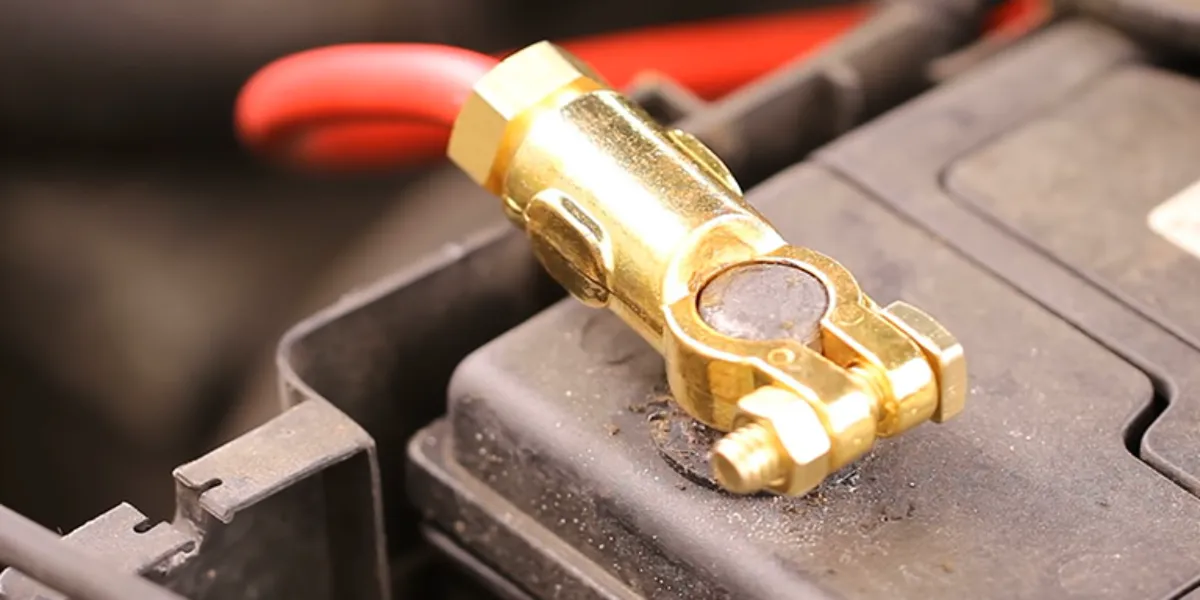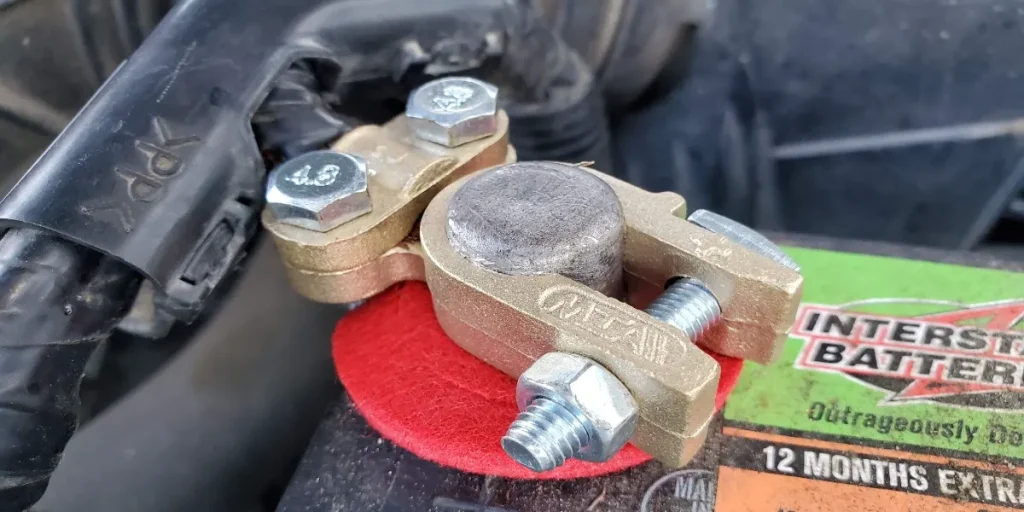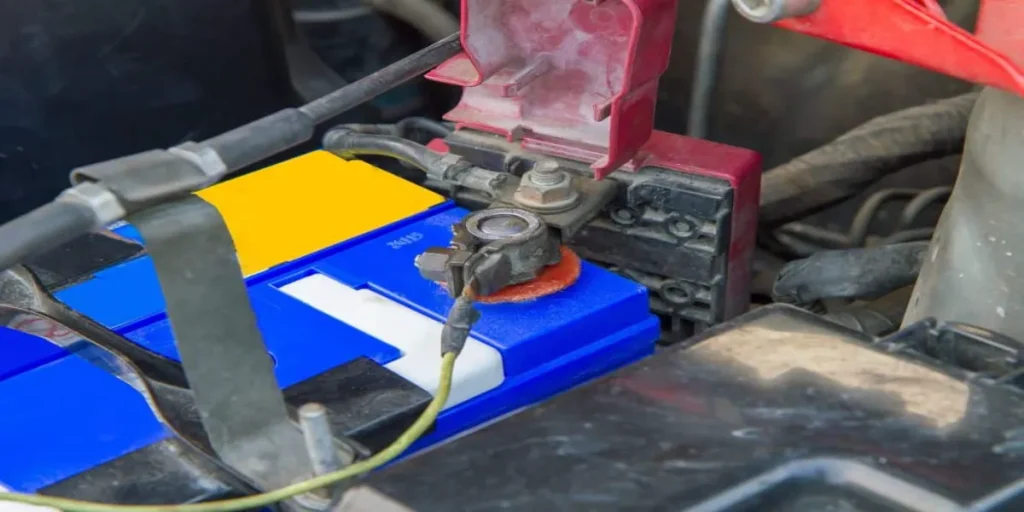Understanding the correct size of a bolt for a battery terminal is crucial for anyone dealing with vehicles or electronic devices.
Knowing what size bolt for the battery terminal helps ensure a secure connection, optimizing performance and extending battery life. Conversely, the wrong bolt can lead to loose connections, risking safety and functionality.
In this blog, we’ll guide you through the process of determining the correct bolt size, explore various types of bolts suitable for battery terminals, and share tips on how to avoid common mistakes. Let’s unlock the power of knowledge together!

What Size Bolt For Battery Terminal?
For battery terminals, the recommended bolt size is 5/16 inch (or M8 in metric measurements). This size ensures a secure connection between the battery cable and terminal, ensuring reliable electrical conductivity and preventing loose connections.
Battery Terminal Bolt Size Chart:
| Bolt Size | Metric (mm) | Imperial (inches) | Common Usages |
|---|---|---|---|
| Standard | M8 | 5/16″ | Automotive Battery Terminals |
| Small | M6 | 1/4″ | Smaller Vehicle Battery Terminals |
| Large | M10 | 3/8″ | Heavy-duty Vehicle Battery Terminals |
| Extra Large | M12 | 1/2″ | Industrial Battery Terminals |
Importance of Choosing the Right Size Bolt for Battery Terminals
Security of Connection
When you connect a battery terminal to a cable, it’s like shaking hands with a friend. You want a firm, secure grip.
The right size bolt is like the perfect handshake. It holds the terminal and cable together tightly.
If the bolt is too small, it might not hold the terminal and cable securely. If it’s too big, it might not fit at all. So, choosing the right size bolt is crucial for a secure connection.
Effect on Battery Performance
Imagine you’re trying to drink a thick milkshake through a narrow straw. It’s hard, right? The same thing happens when your battery’s connection isn’t tight enough.
The energy (like the milkshake) can’t flow properly. This can affect your battery’s performance.
But with the right size bolt, you ensure a good connection and smooth energy flow, just like enjoying a milkshake through a wide straw!
Longevity of Battery Life
Choosing the right size bolt can also help your battery live longer. Think of it like wearing comfortable shoes.
If your shoes fit well, you can walk longer without getting tired or hurting your feet.
Similarly, when the bolt fits well, your battery can work efficiently for a longer time without getting ‘tired’.
So, remember to choose the right size bolt to keep your battery ‘walking’ longer!
Different Types of Bolts Suitable for Battery Terminals

Stainless Steel Bolts
Imagine a superhero that’s strong and doesn’t rust. That’s what stainless steel bolts are like! They’re super durable and can resist corrosion, which is like the villain in our story.
These bolts are great for battery terminals because they can last a long time without getting rusty.
Zinc-plated Steel Bolts
Now, let’s think about a superhero who’s not only strong but also budget-friendly. That’s our zinc-plated steel bolt!
These bolts are affordable and provide good conductivity, which means they allow electricity to pass through easily. They’re like the economic superheroes of the bolt world!
Brass Bolts
Next up, we have the brass bolts. They’re like the friendly neighborhood superheroes who are easy to work with.
Brass bolts are easy to install and have excellent conductivity. They’re great for people who are new to installing battery terminals because they’re so user-friendly.
Aluminum Bolts
Last but not least, we have the aluminum bolts. They’re like the lightweight champions of the bolt world.
Aluminum bolts are light but strong, and they’re resistant to corrosion. They’re great for applications where weight matters, like in small vehicles or portable devices.
How to Determine the Appropriate Bolt Size for Battery Terminals
Measuring Thread Diameter
To figure out the right bolt size for a battery terminal, start by measuring the thread diameter. It’s the distance across the bolt’s top.
Think of it like measuring the width of a circle. Use a ruler, and look at the marks. If it’s 8mm between the points, it’s an M8 bolt!
An example would be checking a bolt on a car battery. Place the ruler straight across the wide part of the bolt. Read the number; that’s your size!
Considering the Battery Terminal Size
Next, you want to think about how big the battery terminal is. Bigger terminals usually need bigger bolts. A small bolt won’t hold a big terminal well.
It’s like trying to use a small lid on a big pot; it doesn’t fit right!
For instance, if you have a large terminal on a truck battery, a larger bolt, like an M10, would be suitable. Check the terminal size and match it with the bolt!
Accounting for Terminal Types
Different terminals need different bolts. There are types like the ring, hook, and pin. Each one needs the right bolt to connect securely.
It’s like fitting pieces in a puzzle; the right piece goes in the right place! For example, a ring terminal has a hole in the middle. Measure this hole, then find a bolt that fits through it snugly, not too tight or too loose!
Checking the Vehicle’s Manual
Always peek in the vehicle’s manual. It’s a book in your car that tells you lots of helpful things, like which bolt size to use for the battery terminal.
It’s like a recipe book but for your car! Say your manual states that your vehicle requires an M8 bolt for the battery terminal. Follow that instruction. It’s there to help you find the exact fit for your vehicle!
Using a Thread Checker
A thread checker is a handy tool. It has holes and pegs with different sizes and types of threads. You can check the bolt by screwing it into the holes until it fits just right. It’s like finding the right key for a lock!
If you have a bolt and are unsure of its size, just try fitting it into the holes in the thread checker. When it fits perfectly, you’ve found the correct size!
Factors Influencing Bolt Size Selection for Battery Terminals

Battery Terminal Material
Just like you need different types of shoes for different activities (running shoes for running, boots for hiking), different battery terminal materials require different bolt sizes.
Voltage Requirements
Think of voltage as the speed of a car. Higher voltage batteries (like faster cars) may require larger bolts (like bigger engines) to handle the increased power.
Environmental Conditions
Harsh conditions, like extreme cold or heat, may require more durable bolts. It’s like wearing a heavy coat in winter or a light T-shirt in summer.
Type of Vehicle
Different vehicles, like cars, boats, or motorcycles, have different requirements for bolt sizes. It’s like how different animals need different sizes of homes.
Availability and Cost
The availability and cost of bolts can influence your choice. It’s like choosing between different brands of cereal at the grocery store.
Installation Considerations
Ease of installation is another factor to consider. Some bolts are easier to install than others, just like some toys are easier to assemble.
Corrosion Resistance
Bolts that resist corrosion can extend battery life. It’s like using an umbrella in the rain to stay dry and avoid getting sick.
Mistakes to Avoid When Choosing Bolts for Battery Terminals
Over-tightening Bolts
Tightening a bolt too much is like squeezing a water balloon too hard. It can damage the terminal or cable, just like the balloon can burst. So, remember to tighten the bolt just enough, not too much!
Choosing the Wrong Material
Choosing the wrong material for a bolt is like wearing a wool sweater on a hot summer day. It’s not suitable and can lead to problems.
The wrong material can lead to poor conductivity or corrosion. So, always choose the right material for your bolt!
Ignoring Corrosion
Ignoring corrosion on your bolts is like ignoring a toothache. It can affect performance and should not be ignored. If you see any signs of corrosion, it’s time to replace your bolts!
Overlooking Manufacturer’s Recommendations
Not following the manufacturer’s recommendations is like not following a recipe when baking a cake. The result might not be what you expect!
Always follow the manufacturer’s recommendations when choosing bolts for your battery terminals.
FAQs
What is the importance of choosing the right size bolt for a battery terminal?
Choosing the right size ensures a secure and optimal connection, preventing potential damage and ensuring the longevity of the battery.
Can over-tightening bolts on battery terminals cause any issues?
Yes, over-tightening can damage the terminal or cable, similar to how squeezing a water balloon too hard can make it burst.
How does choosing the wrong material for a bolt affect the battery terminal?
The wrong material can lead to poor conductivity or corrosion, impacting the overall performance and lifespan of the battery.
Do different types of vehicles require different bolt sizes for battery terminals?
Yes, different vehicles like cars, boats, and motorcycles have varying requirements for bolt sizes depending on the specifications of the battery terminals.
Can environmental conditions influence the selection of bolt size for battery terminals?
Yes, extreme conditions like heat or cold may require more durable bolts to maintain optimal connection and performance.
Conclusion
Choosing the right size and type of bolt for your battery terminal is crucial. It ensures a secure connection, optimal performance, and longer battery life.
Always consider factors such as terminal material, voltage requirements, environmental conditions, vehicle type, availability, cost, installation considerations, and corrosion resistance when making your selection.

